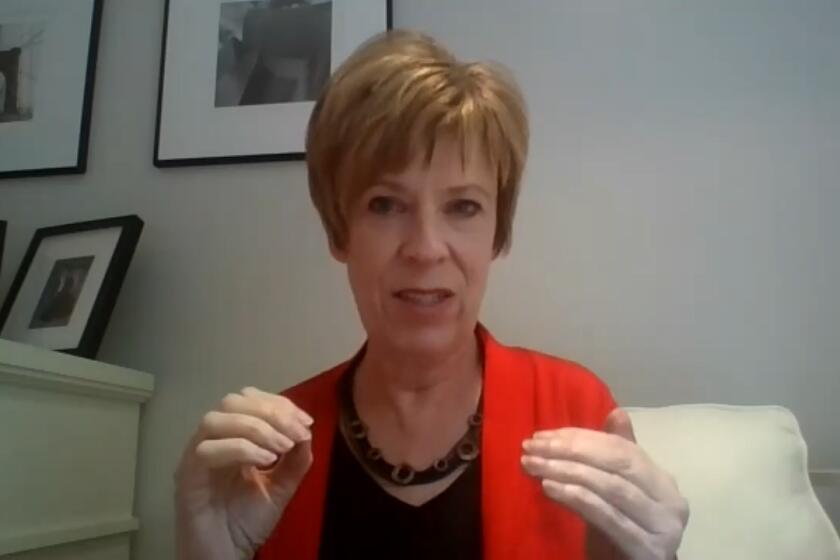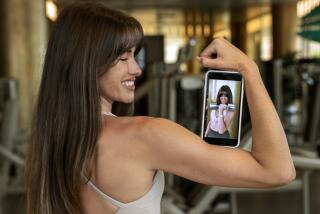How indie fitness studios are pivoting to stay alive amid the shutdown
- Share via
Barre Attitude, Stephanie Jones’ barre fitness studio in Long Beach, had been open for only three weeks when she was ordered to close its doors as part of the statewide COVID-19 lockdown.
The next week she was learning to shoot and upload video to a new platform, hoping to persuade her studio’s members to continue their memberships by credit card and work out with her streaming videos.
“This was not in my wheelhouse at all,” Jones said, but her daughter helped her set up her tripod, film and upload the workouts. She has begun to put short live-stream workouts on Instagram to try to attract new online customers.
Jones and much of the fitness industry, which employs more than 800,000 people nationwide, are facing a crisis. Closures have forced this once booming industry to begin mass layoffs of instructors and trainers as gyms and studios consider permanently shutting their doors.
New York-based Flywheel Sports, a bicoastal spin studio, has laid off 98% of its workforce.
“It’s Armageddon right now,” said Brian Smith, managing director of Piper Sandler Cos., which tracks the boutique fitness industry. The situation with small operators is particularly bad, he said.
Is it safe to have sex with my partner or with a person I met on Tinder? Can I pick my nose at home? Do I need to disinfect my groceries? A virologist answers.
“If you are closed for 30 to 60 days, you are wiping out half of the annual profit,” he said, given the industry’s relatively thin margins. “Mom-and-pops may go out of business.”
Some stimulus relief in the form of favorable small-business loans will help gyms and studios make the payroll or pay the rent. Under the new legislation, passed last month, instructors can seek unemployment. Many employers will tap payroll tax relief and employee retention credits.
But analysts say the shutdown will almost certainly have lasting repercussions for most studios and even bigger operators such as Irvine-based Xponential Fitness, which franchises the Club Pilates, Pure Barre, CycleBar and Stride brands, as franchisees struggle to pay royalties when their doors aren’t open.
Many owners are getting creative to keep the income coming.
Some spin studios are renting weights and bikes by the week for use at home to keep members in the fold (and away from Peloton), and live streaming workouts on Instagram.
For many, Zoom may be the way forward, allowing trainers to teach and communicate with their members in real time, encouraging their efforts and correcting their form.
(Full disclosure: Times owner Dr. Patrick Soon-Shiong is an investor in Zoom.)
“People are craving human interaction right now,” said Carrie Minter, owner of Carrie’s Pilates Plus in Los Angeles, which has switched to offering five $10 Pilates mat classes each day on Zoom. “They want someone to thoroughly explain things,” she said, which works better on Zoom than on a pre-recorded video.
Others, such as Luke Milton, owner of Training Mate, a high-intensity interval training workout with studios in West Hollywood, Santa Monica and Studio City, are uploading password-protected workout videos on Vimeo for members.
Milton’s new “Mate To Go” livestreaming workouts cost $99 a month, with proceeds funding payroll for his employees, who were receiving 75% of their wages for the first weeks of the lockdown.
“It has been one of the most humbling experiences of my life, the amount of support we have gotten from the community,” said Milton. “We’ve had members keeping their memberships active [with online workouts] to support the studios. It has really made me believe in humanity.”
Milton said he considers his members family and often stays up until 2 or 3 in the morning, answering emails or joking with members on social media, to nurture the community he has created over the last decade.
Leanne Pedante, co-owner of the Stride treadmill running studio in Pasadena, said the facility is lucky to have a tight-knit group of members. Although it has paused memberships, it is teaching free daily body-weight workouts on Zoom it promotes on social media, and is encouraging members to take part in outdoor mileage challenges, such as last month’s 75-mile running goal.
In the midst of this coronavirus crisis, I just wanted a simple mask for running essential errands, like a trip to the pharmacy. I made a no-sew mask out of a sock. It won’t win any fashion awards, but it will help keep my 76-year-old mother (and my husband and me) safe.
Of course, this doesn’t pay the bills. As the studio puts together more recorded workouts, Pedante said, she hopes to switch to a reduced-price online membership fee so she can pay more instructors.
For Minter, scrambling to put together online workouts has allowed him to add new clients from out of state and create another revenue stream for the studios when they reopen.
“It has become better than we would have even thought,” Minter said.
The accelerated shift to streaming fitness raises the question of how many studios will be able to regain full membership once this sheltering and exercising in place is over.
In a recent survey of 13- to 35-year-olds by research firm YPulse, 77% said they regularly engage in fitness activities; among that group 32% said they’d prefer to work out at home than in a gym, a class or anywhere else.
Sales of connected at-home fitness equipment such as Mirror, Tonal and Peloton spin bikes have surged in the last month. And because Peloton is making its app free for three months, it’s hard to believe local studios won’t experience at least a few defections.
Moreover, those who do return may not be able to spend quite as freely on unlimited memberships or big class packs.
“The economy will really dictate how much people will spend,” Pedante said. But, she adds, “I think people are really going to want that community connection and need a gathering space.”
“The studios that will have trouble coming back from this are the ones that don’t have a genuine community,” Milton said, “those that are based just on their workout and not on their community experience.”
More to Read
Sign up for The Wild
We’ll help you find the best places to hike, bike and run, as well as the perfect silent spots for meditation and yoga.
You may occasionally receive promotional content from the Los Angeles Times.










